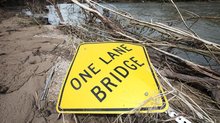With the threat of severe thunderstorms, including more tornadoes, and floods continuing in parts of the South and lower Midwest and the threat of ice storms, heavy snow,and damaging winds, much of the U.S. is reeling from winter storms. In addition, a methane gas leak in Southern California has caused upheaval and relocation of local residents and their animals leaving many horse owners wondering what will be coming their way next.

Protecting horses and humans during disasters
In addition to Mother Nature's list of natural disasters such as flash floods and tornadoes, horse owners need to consider other potential dangers to horses such as the possibility of man made emergencies including gas leaks or propane spills.
No one is immune from the possible effects of a disaster, no matter what the season, but preparing ahead of time and having an emergency plan in place before disaster strikes will help to keep our horses safe and out of harm's way.
Plan it Out
Being aware of the possible risks in your region is the first step toward preparing for any possible disaster that has the potential to cause a short term or long term disruption to you, your family and your animals. Is your area prone to flooding? What about tornadoes or blizzards? If the roads are closed, how do you get food to your horses?
The next step is to plan for any possible extended disruption of services. Authorities usually recommend having at least two weeks supply of feed/hay on hand, and kept stored in a dry area. Top off all water tanks and buckets before an impending storm, and store additional water in plastic trash cans secured with lids in a safe place.
Consider having well-maintained generators on hand to provide emergency power, and have enough fuel to keep them running for several days. Always keep an up-to-date emergency care kit that includes vetwrap, bandages, medications, flashlights, batteries, etc. Having an envelope set aside with emergency cash, the amount depending on your budget and needs will also come in handy for times such as these.
In addition to Mother Nature's list of natural disasters, you should also consider other potential dangers such as wildfires or the possibility of manmade emergencies including gas leaks or propane spills. Many times, these result in evacuation with very little notice.
In the case of an evacuation, while you might be able to take the family pet along with you to a hotel, it's not the time to start calling around to find a safe location to move your horses. Prearrange an evacuation site for your horses and map out primary and secondary routes in advance.
Develop a buddy system with friends and neighbouring barns. Don't hesitate to ask for help when the time comes. Also, make sure your horses are trained to easily load and unload from a trailer. If evacuation is not possible, decide where on the property to safely store your horses.
Micro chipping, branding, or tattooing, along with registration with online identification agencies, provides a permanent form of animal identification. As an alternative, ensure that your horses are equipped with some form of identification such as a halter tag, neck collar, or leg tag that contains your contact information, should you have to leave them behind.
Human Safety Comes First
In the case of a natural or man-made disaster, it's important that the safety of humans come first, says District Chief Victor MacPherson of the Adjala-Tosorontio Fire Department. "Make sure that you and your family are safe before assisting your animals," he says. "In the case of a fire or flash flood, this is where emergency preparedness comes into play. If the barn is on fire or flood waters threaten your property, what do you do? What do you do with your livestock?"
"My advice is, if it's safe to do so, try to get them out. However, if you bring them out of the barn and just turn them loose, most likely the horses will try to run back into the barn. That's where their haven is; what they consider to be their safe place. People should have a location in mind ahead of time to safely keep them together, such as a field or another barn far away from the fire or flooding."
As is often the case in an emergency when people call 911, firefighters are usually the first responders to the scene. Because of this, many firefighters are now receiving training in how to handle animals in emergency situations.
Preparedness is Essential
While it's impossible to prepare for all conditions, don't let an emergency situation catch you off guard. Having a basic plan in place ahead of time for either the evacuation or sheltering of your horses allows you to handle an emergency with less stress and a clearer head.
"Pre-incident planning is crucial for any farm owner," says Chute. "Farms by their very nature contain many hazards to humans, animals and the environment, and careful planning before the event of an emergency can save lives and property."
"Local fire departments are usually quite happy to assist in developing pre-incident plans and can give further advice on fire detection and suppression systems that can be retrofitted or installed in new buildings. Regular inspection and repair of all human and animal housing and fencing will go a long way to keep you and your animals safe."
